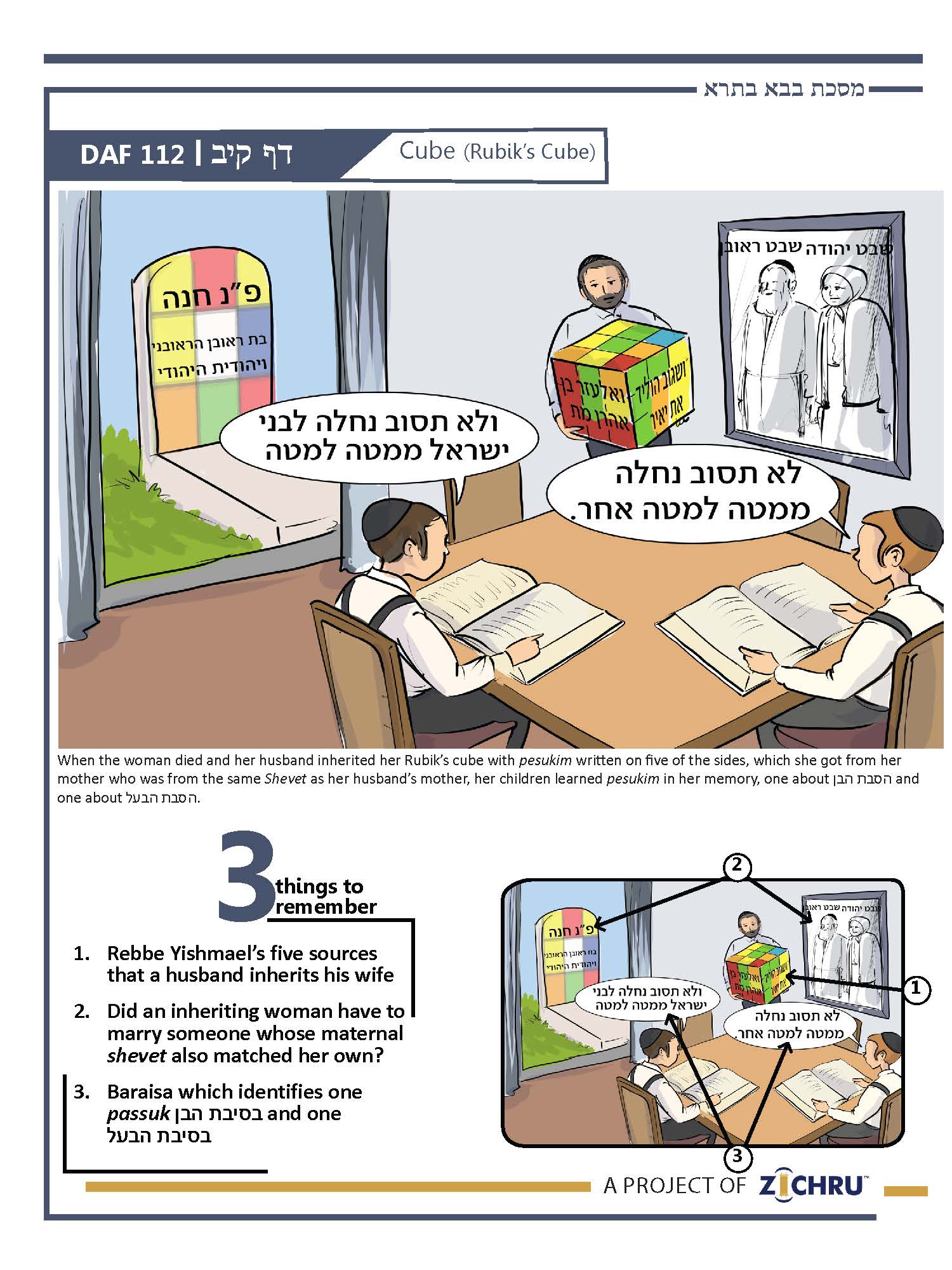- Audio Timestamps
0:00 - The 3 Sugyos
3:08 - Review of 3 Sugyos
6:03 - Siman
7:37 - 4 Blatt Back Chazarah
14:49 - Pop Quiz (Last 7 blatt)
For access to all Zichru resources including PDFs, and illustrations CLICK HERE
- Rebbe Yishmael’s five sources that a husband inherits his wife
Rebbe Yishmael quotes a series of five pesukim proving that a husband inherits his wife, and the Gemara seeks to explain why they are all necessary. (1) The Torah required a woman who inherited her father’s estate to marry within her own shevet, so the estate should not be transferred to another shevet when her relatives inherit her. Although Rebbe Yishmael said this refers to הסבת הבעל – the transference through the husband’s inheriting his wife, it may not be conclusive, because perhaps the passuk is about סבת הבן – the transferring through [her] son’s inheriting her, but a husband does not inherit his wife!? (2-3) Two pesukim which forbid the transferring of estates to another shevet may only be adding לאוין onto the positive עשה requiring her to marry within her own shevet. (4) A passuk implying that Pinchas owned land which his father Elazar did not, may be a result of Pinchas inheriting his mother. (5) A passuk implying that Seguv’s son Yair owned cities which Seguv did not, cannot refer to Yair inheriting his mother, because another passuk would be unnecessary. Rather, it must be that Yair inherited his wife. Rav Pappa questioned even this source, and according to the Rashbam, his question goes unanswered.
- Did an inheriting woman have to marry someone whose maternal shevet also matched her own?
Abaye asked about the requirement for an inheriting woman to marry someone from her own shevet, to keep her estate in her shevet: סוף סוף הא קא מתעקרא נחלה – in the end, an inheritance will still be uprooted משבטא דאימא לשבטא דאבא – from the mother’s shevet to the father’s shevet, because her mother’s estate will be inherited by her husband, who is from her father’s shevet!? Abaye was uncertain if we say "שכבר הוסבה" – that [the estate] was already transferred previously, as soon as the woman inherited her mother, since the woman herself is of her father’s shevet. If so, we are unconcerned about the mother’s estate transferring to her husband’s shevet. If we do not say "שכבר הוסבה", Abaye explains that the Torah would require an inheriting woman to marry a man דאבוהי משבטא דאבוה – whose father is from her father’s shevet, ואימיה משבטא דאימה – and whose mother is from her mother’s shevet, thus preventing the mother’s estate from becoming completely transferred to the father’s shevet.
- Baraisa which identifies one passuk בסיבת הבן and one בסיבת הבעל
Two pesukim prohibit a woman who inherited an estate to marry outside her shevet. The Gemara at the beginning of this Daf explained, according to Rebbe Yishmael, that both pesukim may refer to a son inheriting her, to add two לאוין to the positive עשה. Here, the Gemara quotes two Baraisos which identify the first passuk as referring to "סיבת הבן" – transferring through a son’s inheriting, and the second as referring to "סיבת הבעל" – transferring through a husband’s inheriting (proving that a husband inherits his wife). The first Baraisa, quoted on this Daf, quotes the first passuk: "ולא תסוב נחלה לבני ישראל ממטה אל מטה" – an inheritance of Bnei Yisroel shall not be transferred from shevet to shevet. בסבת הבן הכתוב מדבר – The passuk is discussing transferring through the son inheriting. It cannot be discussing transferring through the husband inheriting his wife, because the other passuk, ולא תסוב נחלה ממטה למטה אחר – an inheritance shall not be transferred from a shevet to the shevet of another, is discussing סבת הבעל – transferring through the husband inheriting. The next Daf will explain the basis for this assertion.
Siman – Cube (Rubik’s Cube)
When the woman died and her husband inherited her Rubik’s cube with pesukim written on five of the sides, which she got from her mother who was from the same shevet as her husband’s mother, her children learned pesukim in her memory, one about סיבת הבן and one about סיבת הבעל.







